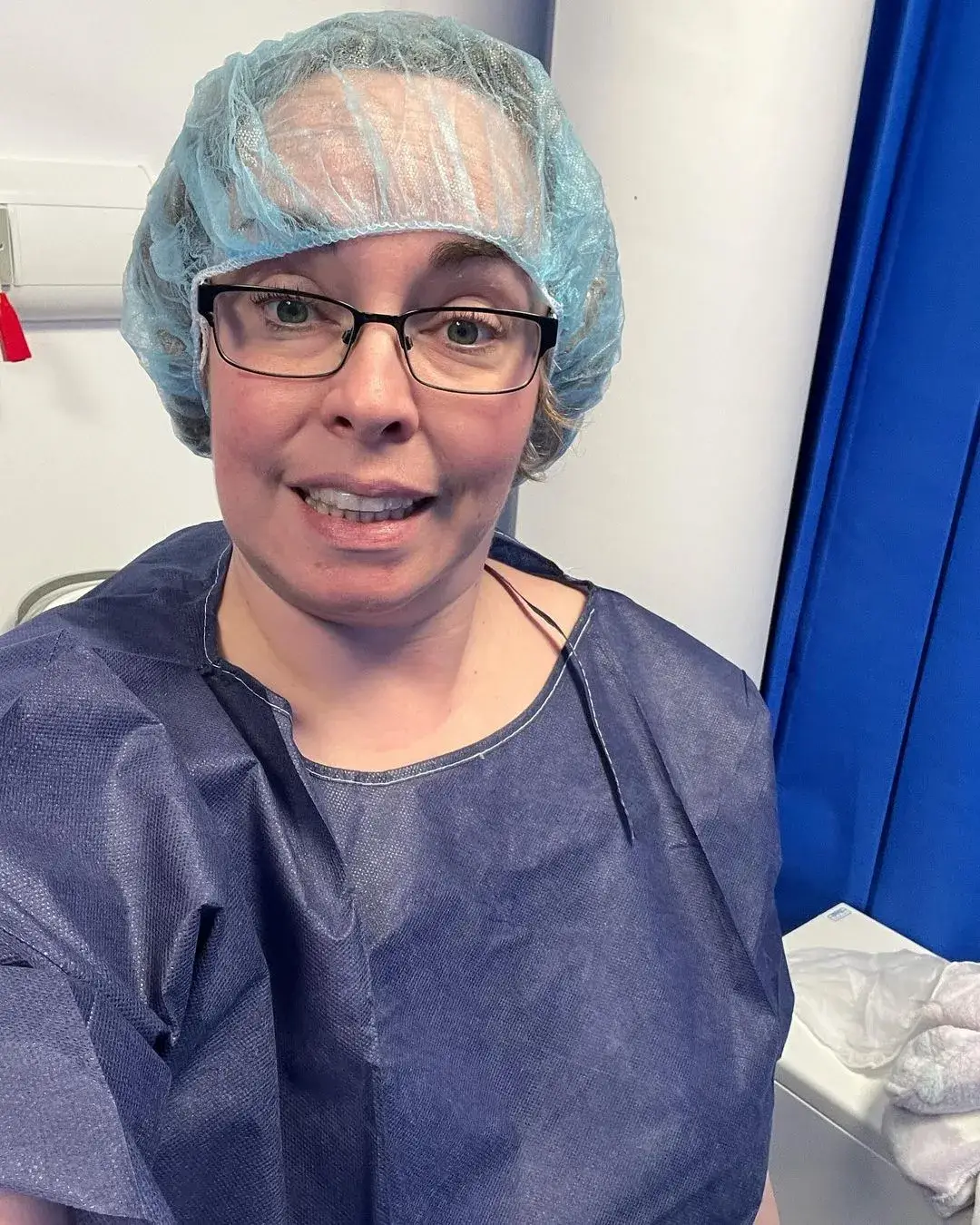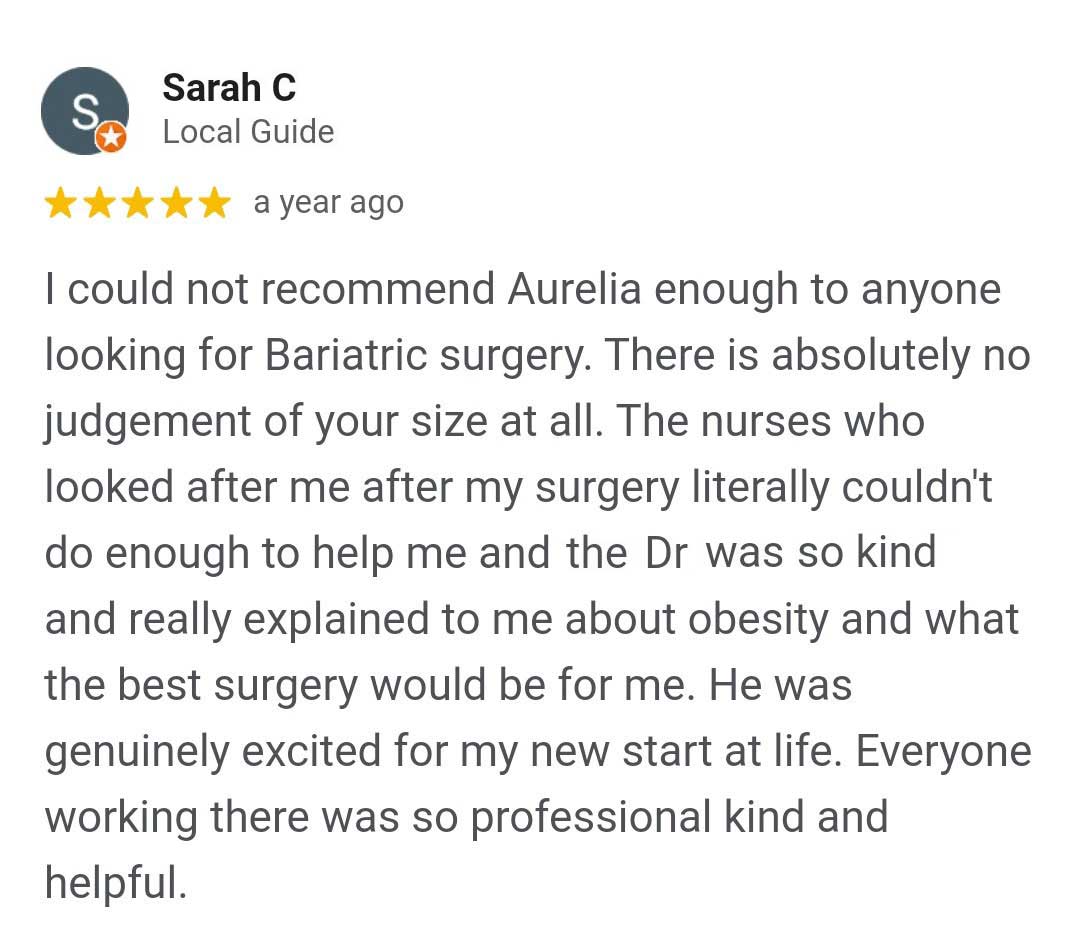Gastric Sleeve Surgery In Ireland
Gastric sleeve surgery can help you lose significant weight by reducing appetite and supporting long-term health changes.
Excellent 4.8 out of 5

Trusted by 35,000+ Irish Patients Since 2001
Gastric Sleeve At A Glance
Weight Loss
60-70%
Surgery Duration
1 to 2 Hours
Anaesthesia
General
Hospital Stay
1 night
Avg.Recovery
2 Weeks
Price
From €297/month

Meet Your Gastric Sleeve Surgeon
When you’re putting your health and future in someone’s hands, experience matters. Dr. John Loy is head of our Bariatric Unit.
Dr. Loy is a world-renowned Consultant Bariatric Surgeon, originally from Antrim and operating full-time at Auralia.
+2,100 successful procedures
Member of the Royal College of Surgeons

+2,740 successful procedures
Member of the Royal College of Surgeons
Senior Lecturer at Queen Mary University, London
Gastric Sleeve Surgery Explained by Dr Loy
Book a free online or in person consultation with Dr Loy today!
The Benefits Of Gastric Sleeve Surgery

Full insurance provided to protect you from complications.
Katrina's Weight Loss Story with Auralia



I have struggled with my weight my entire life, and it had completely spiralled out of control, peaking at 26st 7lbs.
1 year later and almost 12st less, I can safely say that having this surgery almost certainly saved my life. I had high BP and was pre-diabetic, both of which has been comfortably reversed without medication.
I will be forever grateful to my team at Auralia for giving me back the control over my life that I had lost, and I can’t recommend them enough.Katrina Darcy
Why Patients Trust Auralia With Their Gastric Sleeve Surgery
Unmatched Experience
25 years of experience and over 35,000 procedures performed.
International Accreditation
Internationally accredited private hospital with state of art facilities. No long waiting lists!
Expert Team
A full experienced medical team led by one of Ireland’s most experienced bariatric surgeons.
All-Inclusive Package
Surgeon, theatre, & aftercare with monthly payment options—no hidden fees.
Personalised Care
Custom support from consultation to recovery, designed for you.
Patient Centric
A welcoming, judgment-free environment where your goals are always the priority
Featured In


















Awarded for Outstanding Patient Service
1st Internationally Accredited Private Hospital in Ireland



- 3 Locations Across Ireland
- Online & In-Person Consultations
- 25 Years of Experience
- 3 Locations Across Ireland
- Online & In-Person Consultations
- 25 Years of Experience
Gastric Sleeve Price & Finance in Ireland
The Sleeve Care Plan. Everything included. No hidden fees.
✦ Gastric Sleeve Care Plan ✦
✦ Consultant surgeon assessment and pre-operative tests
✦ Free consultations
✦ Hospital, anaesthesia, dedicated bariatric theatre
✦ Post-operative night in hospital
✦ Dietitian program and supplement guidance
✦ Auralia App : Access to excercise, lifestyle & cooking classes from your home
✦ Surgical insurance post operation
✦ Scheduled follow-ups and full Irish aftercare
From €297 per month
Finance options (up to 36 months)
We’ll handle everything with you, so it feels simple and stress-free
Your Gastric Sleeve Journey
Step 1.
Free consultation with your surgeon
You can have your consultation either from home via Zoom or in person at our private hospital. In this first appointment, you’ll meet your surgeon, review your health history and goals, then agree on the next steps together.
To start your surgery process, firstly book your free consultation by calling us on (01) 612 0551 or filling a consultation form here.
Step 2.
Convenient local pre-op tests
You will need blood tests and scans completed prior to surgery. Our team will provide you with all the required instructions and referrals, making this step hassle-free.
Step 3.
Gastric Sleeve Surgery Day
On your surgery day, you’ll have a dedicated medical team to take care of you. The surgery duration is around 90 minutes, and usually you will leave the hospital the next day.
Step 3.
Recovery & Aftercare
Your support continues long after the surgery. You’ll receive a full recovery plan, 24/7 access to our surgical team via an emergency number, remote follow-up through our weight-loss app, and in-person medical reviews at our private hospital when needed.
Auralia's Weight Loss App
Everything you need throughout your journey from the comfort of your home!
Our Auralia Weight Loss App is designed to help you achieve lasting results by supporting every aspect of your weight loss journey. More than just a tracking tool, it’s a holistic companion that keeps you motivated, informed, and connected to your care team.

- Nutritional classes (live & pre-recorded)
- Exercise classes (live & pre-recorded)
- Mindset classes (live & pre-recorded)
- Healthy recipes and Cooking classes
- Food diary and Weight loss tracker
- Dietician appointments
- Instant messaging service with your dietician

Susan's Before & After







I tried pretty much every diet you can think of I've tried: motivation, Weight Watchers, Slimming World, all of them.
Happy, but wish I’d done it sooner. That’s my only regret, is that I didn’t think of doing it sooner, instead of struggling for 41 years with my weight.Susane, 41 years old
How Does The Gastric Sleeve Surgery Work?
VOLUME REDUCTION
The volume of the stomach is reduced and becomes resistant to stretching. What this means is that you feel fuller after eating smaller amounts of food.
HORMONAL REGULATION
Ghrelin, the hormone responsible for stimulating appetite, is usually produced in the fundus of the stomach which is removed during surgery. This causes ghrelin levels to fall which means you end up with more loss for appetite.
APPETITE PREFERENCE ADJUSTMENT
The sleeve helps change your preferences for food. It reduces the need for sweet and fatty foods and reduces the want for alcoholic drinks
Watch Aaron's Journey
My journey started 7 months ago at 22 stone 10lbs, no confidence and unhappy.
Today I am now 15 stone 7 lbs! Down 7 stone 3 lbs, feeling better than ever in life!Aaron Cullen, 25 years old
Aaron did it and so can You!
Do you wonder what is your BMI?
Calculate it below
Take the next step towards a healthier life!
Gastric Sleeve Surgery FAQs
Weight loss after sleeve gastrectomy is achieved in two ways.
- The volume of the stomach is dramatically reduced and more resistant to stretching. This means you feel full, with remarkably small amounts of food.
- The second mechanism of weight loss occurs through changes in a hormone called ghrelin. Ghrelin is normally produced in the fundus of the stomach (the large part removed during surgery) so that after surgery, levels of ghrelin fall dramatically. Given that ghrelin is a strong appetite stimulant, this means there is a marked loss of appetite – so you have no desire to eat. It’s likely that other appetite hormones are involved, which help to make you feel satisfied with much smaller volumes of food.
Aside from the two main mechanisms, nother result of these hormonal changes is that diabetic control can start to improve even before you lose weight.
Aside from the two main mechanisms Another feature of the sleeve is that patients report changes in food preferences, with a reduced interest in sweets, high fat foods and alcoholic drinks, though whether these changes are sustained in the longer-term is not clear.
A patient’s weight loss is largely dependent on how much effort they put into the nutritional and exercise program.
Generally, the more you interact with the program, the more successful you will be. However, Auralia has never had a patient who simply hasn’t lost weight on our gastric sleeve program.
Whilst every person is different, we would expect our gastric sleeve patients to lose around 6-7 stone within the first 12 months. However, many of our patients have lost as much as 11 stone within this time. This is largely dependent on how compliant the patient is with the after-care program.
The gastric sleeve offers a dramatic weight loss relatively easily but unlike the gastric band, the long term weight loss isn’t as favoured.
We offer the possibility of payment over 36 months therefore the gastric sleeve price on average is €297 per month.
The price include everything you need to be covered, from hospital fees, anaesthesia, surgeon, consultations, insurance, App access to aftercare and follow ups. No hidden extras.
To qualify for a gastric sleeve, you must:
● Be between the ages of 25-50
● Have a BMI of 30 kg/m2 or higher
● Have no history of reflux/heartburn
● Have no history of previous weight loss procedures
● Be completely aware of the risks and benefits of the gastric sleeve
Advantages
● Excellent initial weight loss
● Does not require frequent clinic attendance for adjustments
● Reduces hunger hormones (unlike the gastric band)
● Preservation of normal passage of food through the stomach (unlike
gastric bypass)
Disadvantages
● Supplementation to avoid nutritional deficiencies
● Increased risk of reflux post-surgery
● Risk of leak and bleeding
The three main risks to having a gastric sleeve fitted are:
Bleeding: This is the most common complication to occur. A blood transfusion
may be required with a re-operation, but it can be managed without further
surgery.
Leakage: This is the most dangerous complication to occur and it happens when
the contents of the stomach leak through the long-staple line. It can occur in the
first couple of days after the surgery. It is difficult to manage and may require the
patient to stay in the hospital longer.
Reflux: If you have a history of heartburn (reflux) then you won’t be able to opt for
the gastric sleeve. This is because your reflux will become worse after the
operation and you will be less likely to receive successful weight loss. Chronic
reflux can be a really serious problem in the lower gullet (oesophagus) which is
why this risk should not be taken lightly.
There is no doubt that the sleeve can be an excellent choice for some patients and it has obvious advantages compared with the other surgical options. However, the risks are not trivial and there is a tendency to regain weight over time.
If you would like to consider a sleeve, the key thing to remember is that you must stick to the nutritional and physical activity guidelines with which you will be provided.
The mistake made my many sleeve patients is that they think it’s an easy option because it really takes away the appetite and so doesn’t seem to need the same commitment to lifestyle change. This is completely wrong. The reduction of appetite due to changes in ghrelin may not be permanent and if you start eating large quantities again, you may stretch the remaining portion of your stomach. If this happens weight re-gain is inevitable.
REMEMBER: For long-term success the sleeve requires the same commitment to permanent lifestyle change as any other surgical weight loss procedure.
For a desk-based job, many patients return in about 2–4 weeks, depending on how you’re healing and how quickly you adapt to the new eating routine. If your work is physical or involves lifting, it’s common to need closer to 4–6 weeks. Your team will advise based on your job and recovery progress.
Most people describe the first week as soreness and tightness around the small incisions, with tiredness and some discomfort from the gas used in keyhole surgery. Pain is usually manageable with medication and improves steadily over the first 1–2 weeks. If pain becomes severe, worsens, or comes with fever, you should contact your surgeon urgently.
You’ll follow a staged plan while your stomach heals: liquids first, then puréed foods, then soft foods, and finally a gradual return to normal textures in small portions. The exact schedule varies by programme, but the key rules are to prioritise hydration and protein, eat slowly, and progress only when you’re tolerating the current stage comfortably.
Yes. Even after a sleeve, most patients need long-term vitamin and mineral supplements and regular blood tests, because reduced intake can lead to deficiencies over time. Typical supplements include a multivitamin plus additional nutrients such as B12, calcium, vitamin D, iron depending on your results and your team’s protocol.
Your sleeve can adapt slightly over time, meaning you may be able to tolerate a bit more food than in the early months, which is normal. Significant “stretching” is usually linked to repeated overeating and can contribute to stalled weight loss or weight regain, which is why portion habits and follow-up matter long term.
Yes, many women have healthy pregnancies after sleeve gastrectomy, but most guidance recommends waiting 12–18 months until your weight is more stable and your nutrition is optimised. When you do plan pregnancy, you’ll usually need closer monitoring of vitamins and minerals before and during pregnancy.
Sometimes private health insurance may cover gastric sleeve if you meet the insurer’s medical criteria and obtain pre-authorisation, and coverage can depend on your specific plan and the approved facilities.
Through the public system (HSE), sleeve gastrectomy can be accessed via GP referral for eligible patients but waiting lists can apply.
- Have more questions or concerns?
More Inspirational Stories of Our Patients!







Check Your Eligibility For A Gastric Sleeve
Do you wonder what is your BMI?
Calculate it below
Take the next step towards a healthier life!
Want to speak to our advisor on the phone?


